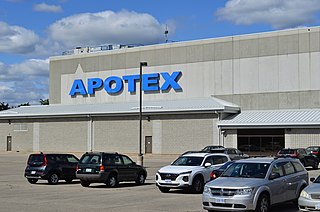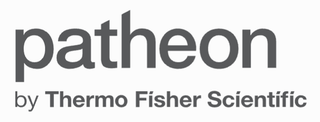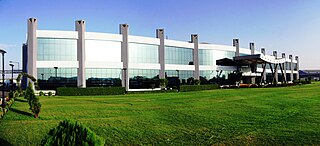History
At the time of the independence of Pakistan in 1947, there were few production units in the country. Currently Pakistan has more than 800 large volume pharmaceutical formulation units, including those operated by 25 multinationals present in the country. Almost all the raw materials used in making of medicine are sourced from abroad. [4] There are factors hindering growth such as the manufacturing of counterfeit drugs made from substandard active ingredients.
The Pakistan pharmaceutical industry meets around 90% of the country's demand of finished dosage forms and 4% of active ingredients. Specialized finished dosage forms such as soft gelatin capsules, parenteral fat emulsions and metered-dose inhalers continue to be imported. There are only a few bulk drug active ingredient producers and Pakistan mainly depends on imports of bulk drugs for its formulation needs resulting in frequent drug shortages. [5] Political disturbances and allegations of under-invoicing add to the uncertainty of imports [6] and clashes with the customs and tax authorities are common.
In 2017, the World Health Organization accredited the first Pakistani drug formulated by Getz Pharma. [7]
Exodus of multinational companies (2000–present)
Over the past three decades, the presence of multinational pharmaceutical companies in Pakistan has significantly dwindled, decreasing to 22 from 48. [8] The decline is attributed to the challenging business environment, where supplying quality medicines at rates lower than production costs has become unsustainable. [8] [3]
In April 2008, Merck Sharp & Dohme (Pakistan) Ltd, an American research-based company operating in Pakistan since 1960, divested its business, including its manufacturing unit and locally registered products to a Pakistani local company, Organon Bio Sciences. [9] [10] Similarly, Bristol Myers Squibb, another American company which was operational in Pakistan since 1984 and was manufacturing antibiotics, blood pressure control and cancer drugs in a local factory, transferred its business and product registrations to GlaxoSmithKline Pakistan in 2008. [10] [11]
From the UK, ICI also disinvested, selling its name and production licenses to a local entity, a move mirrored by Roche Pakistan in 2010. [10] [12] Johnson and Johnson, which entered Pakistan in 1966 upon President Ayub Khan's invitation, sold its pharmaceutical and surgical sutures manufacturing unit to a domestic company. [10]
In November 2016, Merck Group divested its operations to a local company, Martin Dow. [13] [14]
In November 2022, Eli Lilly Pakistan, known for producing Humalog medical insulin for diabetes treatment, announced the closure of its operations in Pakistan. [8] In April 2023, Sanofi exited Pakistan and sold its shareholding to the local investors. [15] In July 2023, Bayer completed the sale of its manufacturing unit and local pharmaceutical brands to OBS Group. [16]
In May 2024, Pfizer sold its manufacturing plant in Karachi and pharmaceutical products to Lucky Core Industries. [17]
Ranbaxy Laboratories Limited was an Indian multinational pharmaceutical company that was incorporated in India in 1961 and remained an entity until 2014. The company went public in 1973. Ownership of Ranbaxy changed twice over the course of its history.
Sanofi S.A. is a French multinational pharmaceutical and healthcare company headquartered in Paris, France. The corporation was established in 1973 and merged with Synthélabo in 1999 to form Sanofi-Synthélabo. In 2004, Sanofi-Synthélabo merged with Aventis and renamed to Sanofi-Aventis, which were each the product of several previous mergers. It changed its name back to Sanofi in May 2011. The company is a component of the Euro Stoxx 50 stock market index. In 2023, the company’s seat in Forbes Global 2000 was 89.

Dr. Reddy's Laboratories is an Indian multinational pharmaceutical company based in Hyderabad. The company was founded by Kallam Anji Reddy, who previously worked in the mentor institute Indian Drugs and Pharmaceuticals Limited. Dr. Reddy manufactures and markets a wide range of pharmaceuticals in India and overseas. The company produces over 190 medications, 60 active pharmaceutical ingredients (APIs) for drug manufacture, diagnostic kits, critical care, and biotechnology.

Genome Valley is an Indian high-technology business district spread across 2,000-acre (8.1 km2)/(3.1 sq mi) in Hyderabad, India. It is located across the suburbs, Turakapally, Shamirpet, Medchal, Uppal, Patancheru, Jeedimetla, Gachibowli and Keesara. The Genome Valley has developed as a cluster for Biomedical research, training and manufacturing. Genome Valley is now into its Phase III, which is about 11 kms from the Phase I and II with the total area approximately 2,000-acre (8.1 km2).
Sanofi Pasteur is the vaccines division of the French multinational pharmaceutical company Sanofi. Sanofi Pasteur is the largest company in the world devoted entirely to vaccines. It is one of four global producers of the yellow fever vaccine.

Apotex Inc. is a Canadian pharmaceutical corporation. Founded in 1974 by Barry Sherman, the company is the largest producer of generic drugs in Canada, with annual sales exceeding CA$2.5 billion. By 2023, Apotex employed close to 8,000 people as Canada's largest drug manufacturer, with over 300 products selling in over 115 countries. Apotex manufactures and distributes generic medications for a range of diseases and health conditions that include cancer, diabetes, high cholesterol, glaucoma, infections and blood pressure.
Torrent Pharmaceuticals Ltd is an Indian multinational pharmaceutical company, part of the Torrent Group and headquartered in Ahmedabad. It was promoted by U. N. Mehta, initially as Trinity Laboratories Ltd, and was later renamed Torrent Pharmaceuticals Ltd.

Lucky Core Industries Limited, formerly known as ICI Pakistan, is a Pakistani conglomerate company headquartered in Karachi. It manufactures polyester, pharmaceutical, agrochemical, soda ash, and veterinary medicine.
Rhône-Poulenc was a French chemical and pharmaceutical company founded in 1928. In 1999, it merged with Hoechst AG to form Aventis. As of 2015, the pharmaceutical operations of Rhône-Poulenc are part of Sanofi and the chemicals divisions are part of Solvay group and Bayer Crop Science.

Patheon is a service brand within Thermo Fisher Scientific's brand portfolio. Contract development and manufacturing organization (CDMO) services offered under the Patheon brand include small molecule API, biologics, viral vectors, cGMP plasmids, formulation, clinical trials solutions, logistics and commercial manufacturing and packaging. In 2017, Patheon was acquired by Thermo Fisher Scientific to form its Pharma Services business.

Sun Pharmaceutical Industries Limited is an Indian multinational pharmaceutical company headquartered in Mumbai, that manufactures and sells pharmaceutical formulations and active pharmaceutical ingredients (APIs) in more than 100 countries across the globe. It is the largest pharmaceutical company in India and the fourth largest specialty generic pharmaceutical company in the world. The products cater to a vast range of therapeutic segments covering psychiatry, anti-infectives, neurology, cardiology, diabetology, gastroenterology, ophthalmology, nephrology, urology, dermatology, gynecology, respiratory, oncology, dental and nutritionals.

Granules India Limited is an Indian multinational pharmaceutical manufacturing company based in Hyderabad. Granules manufactures several off-patent drugs, including Paracetamol, Ibuprofen, Metformin and Guaifenesin, on a large scale for customers in the regulated and rest of the world markets. Granules India Limited also operates in the contract research and manufacturing (CRAM) segment.

Intas Pharmaceuticals Limited is an Indian multinational pharmaceutical company headquartered in Ahmedabad. It is a producer of generic therapeutic drugs and engaged in contract clinical research and manufacturing. It has 22 manufacturing plants, 17 in India and the rest in Greece, United Kingdom and Mexico. In the financial year 2019, 69% of the company's revenue came from international markets while 31% came from India. Its market presence is in more than 100+ countries.
Pharmaceutical fraud is when pharmaceutical companies engage in illegal, fraudulent activities to the detriment of patients and/or insurers. Examples include counterfeit drugs that do not contain the active ingredient, false claims in packaging and marketing, suppression of negative information regarding the efficacy or safety of the drug, and violating pricing regulations.

Amneal Pharmaceuticals, Inc. is an American publicly traded generics and specialty pharmaceutical company. The company is headquartered in Bridgewater, New Jersey.

Martin Dow is a Pakistani multinational pharmaceutical company which is based in Karachi. It was founded in 1995 and has six manufacturing facilities in Pakistan and one in France.
The Verband Forschender Arzneimittelhersteller (vfa) or Association of Research-Based Pharmaceutical Companies, is the trade group of 43 pharmaceutical companies in Germany which are global players, representing more than two-thirds of the German pharmaceutical market, with nearly 80,000 employees in Germany.

The Pharmaceutical Advertising Advisory Board (PAAB) is a Canadian not-for-profit organization based in Pickering, Ontario. Acting as a pseudo-regulatory body, PAAB offers review and pre-clearance services recognized by Health Canada to pharmaceutical companies and marketing agencies who wish to advertise directly to consumers and/or healthcare professionals. It is financed on a fee-for-service basis.










